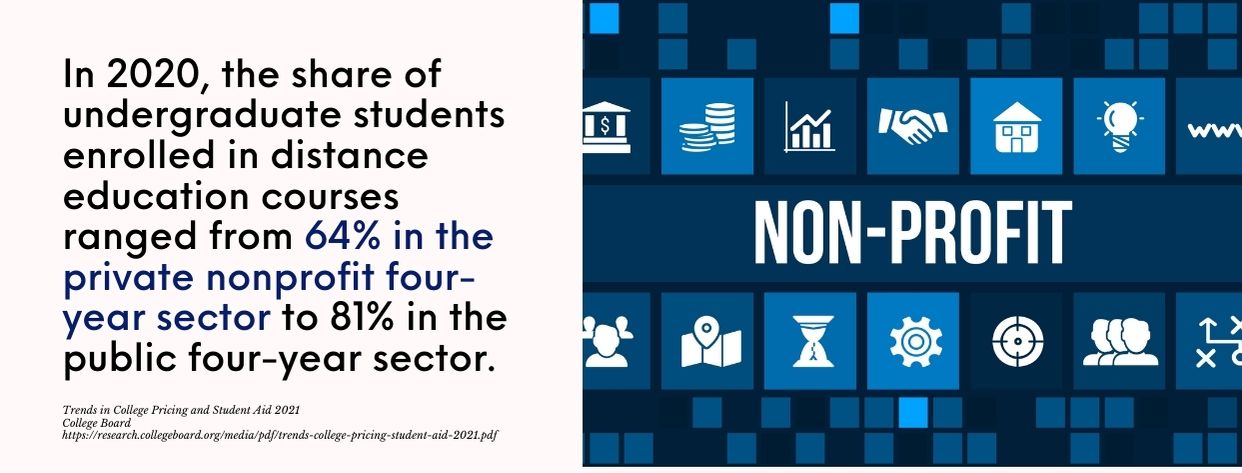Find Your Perfect School
Based on Fall 2019 data, the National Center for Education Statistics (NCES) listed 1,660 nonprofit two-year and four-year schools in the United States. Public two-year and four-year schools kept pace with 1,625 in total while there were 697 for-profit schools.
These numbers show that, indeed, public and nonprofit post-secondary institutions are the most popular among students from all walks of life! But what exactly are nonprofit schools?
Basically, these institutions receive their funding from diverse sources including the state and federal governments, endowments from private individuals and organizations, and tuition and other fees collected from students. But these institutions are more concerned about the improvement of their academic and non-academic services, and less concerned about their profits.
With this definition in mind, a simple classification can be made about the different colleges and universities.
- Nonprofit schools include the Ivy League schools (Brown, Columbia, Cornell, Dartmouth Harvard, Princeton, Yale and University of Pennsylvania), state universities and community colleges
- Mostly nonprofit schools include career and vocational-technical colleges and liberal arts schools
- Private colleges and universities, arts colleges, online schools, specialized mission colleges, and religious-affiliated schools are either for-profit or nonprofit
If you’re considering Christian or non-Christian colleges and universities, you must first research their status, particularly for private institutions. This is because your cost of attendance, student experiences and employment prospects will be affected by the school’s status, whether non-profit or for-profit.
With that said, here are 10 of the top non-profit post-secondary, four-year institutions with online degree programs and courses. Note that these institutions were chosen based on their reputation for quality of instruction, diverse range of academic offerings, and affordable and accessible online education.
FOR MORE DETAILS
Higher Education in the United States
The United States has a diverse lineup of accredited educational institutions at every academic level. While this may cause complexities in your process of selecting the institution and program that will best complement your skills, interests, and passion. You should choose the institution that will help you build your competence in your chosen field.
Based upon the federal Constitution, the United States embraces a decentralized education system. States and local authorities have the power over academic institutions within their respective jurisdictions.
Academic freedom is further enjoyed but individual schools and higher education institutions. Through academic freedom exercise, colleges and universities are free to implement admission standards, courses and programs to offer, and delivery modes. This is not to say that they enjoy absolute freedom. The U.S. education system is rooted in framework laws regulating and defining the decentralized system’s various aspects.
Under the country’s academic structure, a bachelor’s degree is the most common and is considered the first degree in higher education. It also provides a gateway to advanced studies. One can typically earn a bachelor’s degree in four academic years of full-time study.
Some degrees take longer than four years, like engineering, architecture, and other research-based programs. Once you complete a college degree in the United States, you are expected to have learned and completed a breadth and depth of study in your field.
As a degree holder, you have earned competence in your concentration. How you will succeed in the university will determine the course of your professional success. That is why choosing where you get your college education is as important as deciding your major. Begin by knowing the different types of colleges and universities in the United States.

Types of Higher Education Institutions in the United States
Without question, the flexibility it provides and the diverse types of institutions make the U.S. higher education system attractive to many prospective students. Diversity offers students various options to specialize in whatever academic discipline they choose to major in.
More than 4,000 accredited institutions make up the entire higher education system of the country. You can earn your higher education degrees from liberal arts institutions, private colleges, universities, public colleges, universities, community colleges, or institutions with religious affiliations.
There is no standardized or official classification of the kinds of its higher education institutions. Different schools offer varying levels of degrees and programs.
An institution may apply for accreditation to offer a specific program following U.S. accreditation policies. It must comply with the accrediting body’s minimum standards for a degree-granting institution to be granted accreditation.

Different Types of Colleges and Universities
- Carnegie Classification
According to different schemes, the Carnegie Classification® is a privately derived classification that organizes colleges and universities in the United States. It has been the leading framework for reorganizing and describing the diversity in the American higher education system for almost 50 years.
The Carnegie Commission on Higher Education developed colleges and universities’ classification to support its research program and policy analysis. This Carnegie Classification has been in place since 1970.
The Carnegie Classification was first published in 1973 and was subsequently updated in succeeding years with the 2018 revision as the latest version. Revisions reflect the changes that took place among the colleges and universities in the United States.
In the U.S. setting, the words college and university may be used interchangeably, with several schools using institutes in their names. Colleges tend to be smaller compared to universities and are more focused on undergraduate education.
Liberal arts colleges integrate a holistic and comprehensive approach in education. With broad areas of study, like the humanities, creative arts, and science, liberal arts colleges produce well-rounded graduates that lead successful lives after college.
If you choose to enter university, you can earn both an undergraduate and graduate degree. Generally, universities are larger than colleges and offer a wider variety of programs, and emphasize producing research.
- Two-Year Institutions
Two-year institutions or community or junior colleges provide two-year associate degree programs that prepare students for a college education’s rigorous four years. A degree earned from a community college will help you gain occupational skills that will merit immediate employment.
Choose to earn an Associate of Arts (A.A.) or an Associate of Science (A.S.), which you can complete after two years of study. Most community colleges are publicly funded by the state and the local government and communities. However, there are also private two-year colleges that are proprietary or are for-profit.
- Four-Year Institutions
You can earn a bachelor’s degree from a U.S. college or university after completing four years of full-time study. Among the most common degrees conferred by a four-year institution is Bachelor of Arts (B.A.) or Bachelor of Science (B.S.) degree programs. Depending on where you live, the best college or university may be publicly run and funded.
However, the federal government does not manage any academic institution at any level. Oversight is granted at the state and local level, consistent with the country’s decentralized education system.
- Private Universities
Unlike public schools, private colleges and universities do not receive funding from either the state or federal government. Consequently, private institutions operate independently and with no direct control from both the state and federal governments.
Often referred to as “educational businesses,” private schools are very careful about the programs they offer. This is where accreditation comes in. Quality assurance is achieved through the system of voluntary accreditation through specific accrediting agencies recognized by the U.S. Secretary of Education.
- Public or State Universities
Public higher education institutions are state-affiliated bodies that are publicly supported and funded. These include both two-year and four-year colleges and universities offering all levels and degree programs with the widest variety of concentrations.
Public colleges and universities receive the majority of their funding from the State. Post-secondary education funding comprises the third-largest category in state budgets.

For-Profit University
As the name suggests, for-profit colleges are institutions backed by for-profit organizations with the primary purpose of maximizing profits. Profits derived from for-profit colleges are forwarded to their benefactors. In the past 20 years, for-profit higher education institutions have become more common.
Most of these institutions operate fully or partially online, with a physical campus that serves their main campus. However, it is a common misconception that for-profit institutions only operate online. More and more students enroll in online for-profit colleges and universities as the world shift to distance learning modalities.
How does For-Profit University work?
Generally, for-profit colleges and universities are privately-owned higher education academic institutions that often maintain campuses worldwide. For-profit universities offer two- or four-year degree programs in a wide range of subjects and disciplines. Students can choose to enroll on-campus, wholly or partially online. These include post-secondary degrees, as well as graduate and postgraduate degrees in diverse fields.
How are For-Profit Universities funded?
For-profit colleges and universities are largely funded by federal financial aid paid for by American taxpayers’ money. But students still pay tuition and other fees, a significant portion of which is reinvested in the school’s day-to-day business. More importantly, funds collected from students’ tuition are paid to investors, sales, advertising, and marketing.
How much do For-Profit Universities cost?
Without question, for-profit universities cost more than what public colleges charge their students. In the academic year 2018-2019, the median tuition and required fees were $13,354, and when the cost includes room and board, the median cost reaches $26,302. Financial aid may be scarce in for-profit colleges and is limited to loans, federal grants, and scholarships.
What are the advantages of going to a For-Profit University?
- For-profit universities are less selective in the admission process as it adopts open admission to serve nontraditional students. With convenient scheduling and fully online options, there is no question why for-profit colleges are called “second chance schools.” Transferring to one may be relatively easy, but it still depends on the institution’s admission policies.
- For-profit universities embrace diversity with a diverse student body composed of predominantly older, professional students and students from low-income households and single parents.
- For-profit universities offer flexible program options, allowing them to cater to a larger population of nontraditional students. Working adults seeking a degree and raising children at the same time choose for-profit universities. They can earn a degree partially or 100% online.
What are the downsides of attending a For-Profit University?
Despite the remarkable advantages of going to for-profit universities, there are undeniable drawbacks as well. For-profit universities often face accreditation problems covered by flashy and effective marketing materials that purportedly open doors for career success.
There are a few setbacks to this promise. For-profit colleges offer a wide variety of programs and certifications, and you should be careful which program you enroll in. Of course, there are legitimate and widely-recognized programs in more respectable institutions.
Credits earned from for-profit universities may be harder to transfer and accepted by other colleges. A 2017 report revealed that college students coming from for-profit institutions had difficulty transferring their college credits. The Government Accountability Standards Office has found that students have lost at least 94% of their credits when transferring from for-profit colleges to public colleges.
Since for-profit institutions cost higher than public colleges, students end up amassing higher debt and default rates by finishing their degrees. Students from for-profit colleges are more likely to take out loans. In the academic year 2017-2018, 65% of students from for-profit colleges applied and were awarded student loans, while only 46% of students from public institutions took out a loan.

Non-Profit University
Nonprofit universities or not-for-profit universities are higher education institutions that follow the mold of a traditional college. It is a status conferred on schools that serve to educate the public rather than to generate profit. Schools of this kind receive direct public funding and endowments from the government.
The school’s money is reinvested into the school, curriculum, instruction, and other day-to-day operations. This complies with the proscription of distributing their profits to their shareholders. Moreover, nonprofit schools are exempt from paying federal corporate income taxes. Tax exemption is among the reasons that allow these schools to operate with minimal fees from students.
How do Nonprofit Universities work?
Nonprofit organizations seek to provide accessible and affordable academic opportunities for every American student. Unsurprisingly, they are sometimes called mission-driven organizations that maintain a laser focus on the mission they set to do. Instead of ensuring that their investment is returned or realizing a profit from it, they are more concerned with maximizing the possibility of their investment.
Nonprofit institutions offer a diverse slate of courses across various subjects, including liberal arts, sciences, fine arts, and engineering, among others. Modeling traditional instruction modes, nonprofit higher education institutions utilize the most advanced and innovative classroom technologies to aid students’ academic journey. Owing to the direct state funding, each student receives a larger budget when compared to for-profit colleges.
How much do Nonprofit Universities cost?
Assistance from the federal government and financial aid grants makes tuition in nonprofit universities significantly lower than in for-profit universities. The federal government recognizes that investing in student financial aid, scholarship opportunities for faculty members, and basic scientific research is vital in securing its economic competitiveness.
The average tuition in a four-year in-state university is $8,655, while a four-year out-of-state university may cost up to $21,706. You can be sure that out-of-pocket expense is less in nonprofit college institutions. More importantly, you will have quick access to more financial aid options and federal grants.

Private Nonprofit University
The dichotomy of a private nonprofit university may be ambiguous to most! Private nonprofit colleges and universities represent typical college life: a huge campus, diverse student body, and an attractive environment. A body or board of trustees oversees the private nonprofit institutions.
Institutions conferred with this status receive funding from various sources, including the federal government.

No known proprietor funds the school directly, thereby allowing it to focus on providing quality education to every student that comes in. True to their nonprofit mission, private nonprofit institutions exist to realize an educational mission rather than realize a profit from their investment.
How do Private Nonprofit Universities work?
Private nonprofit higher education institutions enroll a significant share of students enrolled at four-year colleges. A descriptive study revealed that nonprofit colleges and universities admitted 3.4 million full-time college students or 30% of all four-year enrollment across the country. This is comparable to the 9% at for-profit and 61% at public institutions.
Much like nonprofit colleges, private nonprofit universities in the United States adopt a highly selective admission process. There is a significant overlap in the characteristics of a nonprofit academic institution and a private nonprofit institution. One principal difference is the cost of in-state tuition.
How much does it cost to attend Private Nonprofit Universities?
Generally, private nonprofit colleges and universities come with a higher price tag even when compared to for-profit colleges and universities. Scholarships, financial aid, and grants help defray the costs.
In the school year 2018-2019, the average tuition and fees for an undergraduate program are $35,830. This is the standard computation of tuition and other fees that colleges and universities publish; however, students end up only paying an average of $14,610 for a four-year degree. After receiving the average amount of $21,220 in grant aid and tax benefits, this attracts more low-income but high-achieving students.
What are the advantages of going to a Non-Profit University?
- Nonprofit colleges and universities carry with them public confidence and a well-established community presence. They abide by current state and federal policies and accrediting agency regulations, resulting in higher accountability.
- All forms of financial aid or federal grants are available in nonprofit colleges and universities. Students can easily apply for scholarships, grants, work-study arrangements, or student loans with the university financial aid office’s help.
- Availability of various financial aid opportunities means that nonprofit colleges and universities cost less.
- Nonprofit colleges and universities are credible, and most schools receive regional, state, and federal accreditation. This will make transferring your credits to another school or program easier. Credits earned from a nonprofit college or university are widely recognized, so you can easily transfer between institutions.
What are the downsides of attending a Non-Profit University?
Nonprofit colleges and universities have a reputation for adopting stringent admission policies that result in many applicants getting denied admission. The highly selective admission process often deter would-be applicants from pursuing a degree in a nonprofit higher education institution despite the promise of an exceptional academic experience.
With the promise of low tuition fees and living costs, nonprofit colleges and universities tend to be overcrowded, especially public nonprofit institutions. Because of limited online options, students remain on-campus as they finish their degrees. It is one of the many reasons private nonprofit universities lead and thrive in the distance learning education sector.

Online Non-Profit University
The spring of 2020 forced the higher education sector to rush to remote learning because of the COVID-19 pandemic. Campuses all over the United States and the world were shut down, exposing the vulnerability and the fragmented adoption of technology and digital capabilities to provide high-quality education to all students.
This has increased the pressure on the more than 4,000 colleges and universities in the country. Online and blended options have become the norm beginning in the fall semester.
Pre-pandemic, however, higher education institutions have realized that traditional modes of teaching may not be sustainable in the long run. As students, teachers, and the government frantically rush to transition from in-person to online learning. There are nonprofit, public and private, universities that offer distance learning options.
How do Non-Profit Online Universities work?
Nonprofit online universities are often an extension or operate as the distance learning arm of traditional brick-and-mortar academic institutions. They no not only carry the same prestige and reputation as their namesake campus, but they also promise to provide the same quality of education to their online students.
Classes are taught by the same faculty that teach on-campus, ensuring that every student has equal access to the same set of competent, renowned faculty members.
You can enroll in almost every study area when you choose to go to a nonprofit online university. They are focused on training competent and skilled graduates. It remains committed to educating future American professionals. And because nonprofit schools are not tied to an obligation to pay dividends to their shareholders, students’ money is reinvested in their online operations.

Factors for Choosing A Nonprofit Online University
Finding the right nonprofit college or university is important in ensuring that you get the highest quality education and experiential knowledge to prepare you for your future career. Many nonprofit online schools offer competitive online degrees without the overwhelming price tag that often comes with it.

Consider these when choosing your online college destination:
How much will I pay for a degree from a Nonprofit Online University?
Much like a degree from a traditional college or university, a degree from a nonprofit online university will require a substantial investment. While an online degree will give you the flexibility to continue working and remain in school, you still need to be wise with your finances.
Some students pay for college out-of-pocket by putting everything from their savings into their tuition fee, room, and board. But there are many payment options for you to consider.
- Financial Aid – Many financial aid sources can help you pay for college. It may come from federal, state, school, nonprofit organizations, and even private organizations and companies.
- Federal Student Aid (FAFSA) – You can fill out and complete a free FAFSA application for you to qualify for the federal student loan. Complete and submit your application online. The form will require you to disclose your financial background, including your family’s financial history and status.
- A grant doesn’t require repayment, except under certain circumstances. The federal government or your state provides grants for students applying for college or technical school. The majority of the federal grants are free money; therefore, eligibility can be difficult to satisfy.

Types of Grants
The United States Department of Education makes available various federal grants to students currently enrolled in a college or university, a community college, or a technical school. The grant is open for both on-campus and online students. Here are the grant programs you can apply for and how:
- Federal Pell Grants
- Federal Supplemental Educational Opportunity Grants (FSEOG)
- Iraq and Afghanistan Service Grants
- Teacher Education Assistance for College and Higher Education Grants (TEACH)
- Scholarships, like gifts, do not need to be repaid. Numerous nonprofits and private organizations offer scholarships to provide financial assistance to college students who lack the means to pay for tuition. Your local communities, religious groups, private companies, individuals, employers, professional and social organizations, and employers are also offered scholarships. The scholarship application can be very competitive. Eligibility is based on merit, talent, or the specific area of study, but there are need-based scholarships. You need to do your research if you think you might be eligible.
- Federal Work-Study Jobs is an arrangement that allows you to maintain a job and earn money to pay for your college education. This will provide you a part-time job for undergraduate and graduate students who needs financial assistance to pay for their education.
- Part-time employment while staying enrolled in school
- Available to undergraduate, graduate, and professional students
- Available to both full-time or part-time students
- Available to both on-campus and distance learners
- Administered and awarded by schools participating in the Federal Work-Study Program
- Loans are offered as a form of financial aid. As it comes in the form of a loan, you must pay it back with interest. Much like a loan you apply for from a bank, you need to understand the loan’s terms and conditions. A loan may come in the form of a federal or private student loan.
Here are the different federal student loan programs:
- Direct Subsidized Loans for need-based undergraduate students to cover tuition fees.
- Direct Unsubsidized Loans are awarded to undergraduate, graduate, and professional students, but there is no requirement to demonstrate financial need.
- Direct PLUS Loans are specially allocated to graduate or professional students and parents of dependent undergraduate students. These loans aim to help both students and parents pay for academic expenses not included by other financial aid.
- Direct Consolidation Loan is a loan program that will allow you to combine all eligible federal student loans under a single loan and loan servicer.
- Aid for Military Families is a special program or additional aid for students who have served in the military or a spouse or child of a veteran.
- Aid for International Study is available to students who are studying abroad or outside the United States.
- Aid and other Federal Government resources provide information on the federal government’s different financial aid programs.
- Tax benefits for education
- Education towards community service with AmeriCorps
- For current and foster care, there are education and training vouchers you can claim
- Scholarships and loan repayment programs through government agencies, including the Department of Health and Human Services’ National Institutes of Health, Indian Health Service, and the National Health Service Corps.

Importance of Accreditation
Accreditation is arguably the most important factor for you to consider when researching which nonprofit online university you will enroll in. Before you make any decision, you should verify whether the school is accredited or not.
You may find the accreditation status on the university’s official website. If you have misapprehensions about its status, you can always verify it through the Council for Higher Education (CHEA) or the U.S. Department of Education. These offices maintain the list of recognized regional, national, as well as programmatic accrediting agencies.
Accreditation sets the quality standards that are put in place to ensure the quality standards and the value of your degree. If you plan on attending graduate school, admissions officers will validate the status of your degree.
Because the graduate program’s application process can be very competitive and rigorous, make sure that your online university complies with accreditation requirements. Consequently, an unaccredited degree can cause you to lose job opportunities or graduate school applications.
Colleges and universities, including nonprofit online universities, may be accredited by either regional or national agencies and programmatic or specialized accrediting agencies.
- Regional Accreditation is typically awarded to nonprofit and state-run colleges and universities. Seven regional accrediting agencies evaluate two-year and four-year higher education institutions in the United States. Many states, however, have their accrediting bodies that operate independently from regional agencies. You may check and learn more about the different agencies and their jurisdiction when visiting the Office of Postsecondary Education. Regional accrediting organizations have limited jurisdiction and may only operate within specific regions of the country.
Regional accrediting agencies and organizations award accreditation to schools, colleges, and universities as their credits and degrees meet these organizations’ minimum standards. It is a voluntary process that is self-regulating the higher education sector.
Regionally accredited colleges and universities mostly accredit nonprofit, academically, state-owned institutions. If you transfer from a nationally accredited university to a regionally accredited one, you may experience some setbacks.
Nonprofit universities are reluctant to accept transfer credits from nationally accredited institutions due to the different academic standards and qualifications. Here are the accrediting agencies that operate regionally and their corresponding jurisdictions:
- Middle States Commission on Higher Education: Delaware, DC, Maryland, New Jersey, New York, Pennsylvania, Puerto Rico, and the U.S. Virgin Islands
- New England Association of Schools and Colleges: Vermont, Maine, Massachusetts, Rhode Island, Connecticut, and New Hampshire
- North Central Association of Colleges and Schools: Arkansas, Arizona, Illinois, Colorado, Iowa, Michigan, Indiana, Kansas, Missouri, Minnesota, New Mexico, Nebraska, North Dakota, Ohio, Oklahoma, South Dakota, West Virginia, Wyoming, and Wisconsin
- Northwest Commission on Colleges and Universities: Idaho, Alaska, Nevada, Oregon, Montana, Washington, and Utah
- Southern Association of Colleges and Schools: Alabama, Mississippi, Georgia, Florida, Louisiana, Kentucky, North and South Carolina, Texas, Virginia, and Tennessee
- Western Association of Schools and Colleges: Guam, California, Hawaii, and American Samoa
- National Accreditation is generally conferred to for-profit, vocational or technical colleges and schools with religious affiliation. Nationally accredited colleges and universities are deemed to have met lower academic standards compared to their regional counterparts. If you are considering enrolling in a nationally accredited college, you must do your due diligence and research the school’s reputation. You must understand how the accreditation status will affect your academic journey.
National accrediting agencies award accreditation across the entire country and typically accredit vocational, technical, and career-based for-profit institutions.
- Programmatic Accreditation is a form of accreditation awarded to specific and individual programs and is usually given by an independent board or agency. An example of this is the Accreditation Board for Engineering and Technology which assesses academic programs in science, technology, engineering, and computing.
Nonprofit online colleges and universities must also comply with the stringent accreditation process. Online schools that fail to meet the requirements run the risk of losing their accreditation.
Online programs have become some of the most sought-after degree options available. Like their on-campus brick-and-mortar campuses, nonprofit online universities also receive accreditation from either regional, national, or programmatic accrediting agencies.
- Accrediting Commission of Career Schools and Colleges
- Accrediting Council for Continuing Education and Training
- Council on Occupational Education
- Distance Education Accrediting Commission
- Middle States Commission on Higher Education
- Middle States Commission on Secondary Schools
- New England Association of Schools and Colleges, Commission on Institutions of Higher Education
- New York State Board of Regents & the Commissioner of Education
- Northwest Commission on Colleges and Universities
- Transnational Association of Christian Colleges and Schools, Accreditation Commission
- North Central Association of Colleges and Schools, The Higher Learning Commission
- Southern Association of Colleges and Schools, Commission on Colleges
- Western Association of Schools and Colleges, Accrediting Commission for Community and Junior Colleges
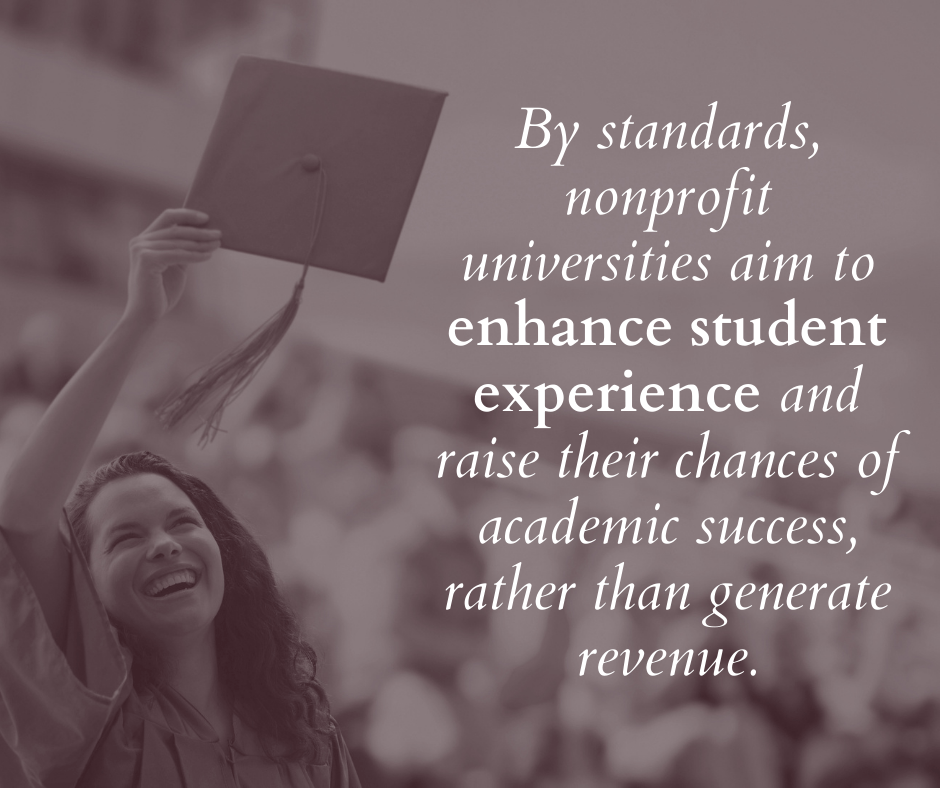
Methodology
Let us help you find the best non-profit school program that fits your educational requirements for starting a new career, a job promotion, or simply meeting your personal goals. Our researchers at PremiumSchools.org utilize these indicators of excellent academic standards to locate exceptional non-profit school programs designed just for you.
The following schools are listed in random order. As each and every school displays its own unique qualities and strengths, you should search our list based on your needs and career aspirations.
The following factors were considered:
- Offers online or hybrid classes for flexible or convenient attendance without compromising hands-on training,
- Provides affordable tuition, often characterized by non-profit colleges or universities,
- Exhibits rigorous, yet engaging and innovative training in the coursework that takes into account the readiness of students to take the next step in their budding career,
- Taught by outstanding faculty consisting of experts in their fields,
- Held in high esteem among academic agencies, industry organizations, and journalistic resources,
- Displays stellar reviews and feedback from school alumni and students,
- Offers a convenient application process,
- Provides exceptional Student Career Centers, Resource Departments, and easy-to-use Learning Management Systems, where applicable,
- Permits a wide range of scholarships, grants, and other financial support programs for eligible students,
- Ensures the proper Accreditation in accordance with academic standards required within non-profit schools.
If you would like to learn more about our selection process, feel free to see our Methodology page!
Top Accredited Non-profit Online University

Purdue University Global
Remarkable Features:
- Public, nonprofit
- Affordable, high-quality education
- Regionally accredited with Programmatic accreditation
Purdue University Global has more than 175 degree programs offering affordable, world-class, high-quality education online. It is a public, nonprofit higher education institution committed to delivering flexible degree programs anywhere in the world. By adopting innovative technologies in online education and outcome-based curriculum, you will gain the necessary skills to compete in the modern workforce.
Online students are provided with a wide range of web-based academic programs with convenient scheduling. User-friendly, interactive and responsive technologies are used for instruction, from accessing learning materials to participating in online seminars and communicating with instructors and peers. Every program has a virtual classroom that evokes the camaraderie and collaboration of in-person classrooms, too.
Students also learn through class discussions, quizzes and exams, instructor feedback, and seminars. Like their on-campus counterparts, online students also have internship and study abroad opportunities designed to empower them with hands-on experiences and networking opportunities.
Purdue Global’s diverse academic programs range from associate to master’s degrees as well as certificate programs. Fields of study are in aviation, criminal justice and nursing, among others, with many programs offering students the opportunity for a ladderized approach to education.
Online students can also enjoy tuition reductions through military benefits, in-state tuition savings, and federal aid. Ask your employer about tuition assistance, too, as well as apply your prior education and experience for credit transfers. The more credits transferred, the less number of credits required for completion at Purdue resulting in more tuition savings.
Purdue is duly accredited by the Higher Learning Commission (HLC) and several programmatic accreditations from specialized accrediting agencies.
Learn more about Purdue University Global’s online degree programs today!


Arizona State University
Remarkable Features:
- A public research university, nonprofit
- Ranked #1 for Innovation
- Military friendly
- Regionally accredited with Programmatic accreditation
Arizona State University (ASU) is a not-for-profit public research university and is among the largest online schools in the United States. ASU offers more than 200-degree programs and certificates and minor programs for pursuing an undergraduate degree. Students have access to some of the highest quality online degrees and courses 100% online through ASU Online.
ASU’s diverse academic offerings cover undergraduate and graduate degree programs as well as graduate certificates. The fields of study are just as diverse, from anthropology and applied biological sciences to business with specializations in sports business, retail management, and tourism. Many of these degree programs have also been nationally recognized for their world-class quality of instruction, such as in journalism and mass communication.
Online students enjoy world-class quality of instruction, too, as their on-campus counterparts, thanks partly to the credentialed faculty members who teach both online and on-campus courses. All students also enjoy a certain degree of customization of their learning experiences, particularly in mapping out their personalized program of study.
Student support services are among ASU’s strongest suits! Online students have easy access to 24/7 counseling, personal care and life services including crisis intervention, health webinars, and legal services. Technical resources and services are also available including 24/7 help center, access to online libraries and research databases, and software.
Online tuition starts at $561 per credit hour but approximately 80% of students receive financial aid including scholarships, grants and federal aid. With its excellent graduate outcomes, no wonder ASU is widely considered among the best value schools!
ASU is duly accredited by the Higher Learning Commission of the North Central Association of Colleges and Schools and programmatic accreditations from programmatic accrediting agencies.
Take a look at Arizona State University’s online degree programs!

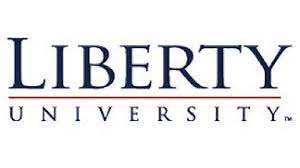
Liberty University
Remarkable Features:
- Nonprofit university
- Maintains low tuition rate
- Award-winning online degrees
- Regionally accredited with Programmatic accreditation
Liberty University prides itself as one the largest not-for-profit universities that provide American students with high-quality education online. It is committed to its mission to “Train Champions for Christ” by ensuring that the cost of education remains low and accessible to every student. With Liberty’s online degree programs, students are prepared for their future successful careers.
Among the fields of study offered in its bachelor’s and master’s degree programs are accounting, aviation, business administration, criminal justice, and information technology. Since many of these fields of study are offered at both undergraduate and graduate levels, students enjoy the benefits of continuity in their education.
Liberty University has also implemented a tuition freeze for all its online bachelor’s programs, and it’s been in place for over seven years! For 2021-2022, its undergraduate per credit hour rate starts at $390 while it’s $565 per credit hour for graduate courses. There are several tuition reduction schemes including military and first responder discounts, corporate tuition assistance and small business discount, and other forms of financial aid.
Students also choose from eight start dates, enjoy the convenience of eight-week online courses, and asynchronous format. Hands-on experiences including internships and practicums enable students to break their routines, gain real-world exposure, and expand their networks.
Student support services include technical support, academic advising and career advising, meaning online students have the right resources for success from admission to graduation.
Applicants only need to submit official high school transcripts and High School Self-Certification form. SAT and ACT scores aren’t required for consideration into the online bachelor’s degree programs.
Liberty is regionally accredited by SACSCOC of the Southern Association of Colleges and Schools Commission on Colleges has various programmatic accreditations from specialized accrediting agencies.
Check out Liberty University’s online degree offerings.


Southern New Hampshire University
Remarkable Features:
- Private, Nonprofit university
- Low tuition fee
- Military friendly
- Regionally accredited with Programmatic accreditation
Southern New Hampshire University (SNHU) commits itself to preparing its students for their dream. Whether you dream of occupying a corner office or of having the freedom that comes with having a degree, SNHU’s online degree programs will lead you there. Explore the more than 200 career-focused online undergraduate degree programs to begin your journey in SNHU’s word-class online education.
The fields of study covered by the degree programs include accounting and finance, art and design, engineering, business and criminal justice, to name a few. These are offered at various degree levels, too, from the associate to the master’s levels in addition to the certificate programs.
The master’s degree programs are notable for their fast pace without compromising on quality of instruction – most can be completed in 15 months! There are numerous MBA programs with specializations, too, and applications to these programs don’t require GMAT and GRE scores.
SNHU also offers over 20 undergraduate and graduate certificate programs, which are non-degree-granting programs. Check out the accelerated bachelor’s-to-master’s degree programs, too, where students earn two degrees in five years. For-credit, individual courses are also offered for individuals who want to earn college credits while also developing new skills.
While it’s a private school, SNHU has affordable tuition – $320 per credit for undergraduate degrees and $627 per credit for graduate degrees. Application fees on all levels are waived, too, and SNHU has frozen tuition since 2012. Credit transfers, military discounts and financial aid are among its popular tuition reduction plans.
With accreditation from the New England Commission of Higher Education (NECHE), and holds several programmatic accreditations from specialized accrediting agencies.
Want to learn more? See Southern New Hampshire University’s online degree options!


Western Governors University
Remarkable Features:
- Private, Nonprofit university
- Low tuition fee
- A leader in nonprofit scholarships
- First online university to be accredited by National Council for Accreditation of Teacher Education (NCATE)
- Regionally accredited with Programmatic accreditation
Western Governors University (WGU) is a testament to American history, as evidenced by its founding story. WGU is a private, non-profile online university offering career-focused, high-quality, affordable bachelor’s and master’s degrees. WGU is a perfect choice for working professionals who aim to complete a college degree while maintaining a job.
Business management, healthcare management, nursing, computer science, cloud computing, and data analytics are among WGU’s academic programs. These are offered in the bachelor’s and master’s degree levels as well as in post-master’s certificate, particularly nursing.
WGU has its unique style of competency-based education where students are allowed to use their prior education and experience in creating their academic paths. Students are evaluated based on their specific knowledge, skills and learning that, in turn, allows them to progress through their program of study at their own pace. You have the opportunity to prove your mastery of the subject matter and its learning materials and, thus, speed up your completion.
Online students enjoy 24/7 access to student support services designed specifically for them, as well as access one-on-one academic support from faculty members. WGU is also a best value institution that combines excellent academic instruction with affordable tuition costs. Average yearly tuition for a bachelor’s degree is $7,290 or about half the cost in a national institution, aside from its flat-rate tuition structure.
WGU earned its accreditation from the Northwest Commission on Colleges and Universities (NWCCU), the National Council for Accreditation of Teacher Education (NCATE), and similar programmatic accreditations.
Western Governors University is ready to tell you all about their online degrees. Check them out!

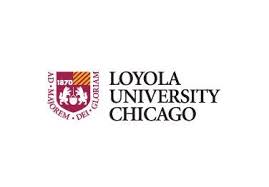
Loyola University Chicago
Remarkable Features:
- Private, Nonprofit university
- Low tuition fee
- One of the largest Jesuit, Catholic Universities
- Regionally accredited and with Programmatic accreditation
Loyola University Chicago (LUC), is one of the country’s top private, nonprofit universities that offer undergraduate and graduate degrees 100% online. LUC is one of the country’s largest universities with a Jesuit Catholic foundation offering 170+ undergraduate, graduate, and certificate programs online. It remains rooted in its teachings and is the only Jesuit Catholic University instituted in Chicago.
Applied psychology, information technology, business, and RN-to-BSN programs are among LUC’s most popular. There are also doctorate programs in education, nursing practice and healthcare mission leadership in addition to the degree completion and master’s degree programs. The diverse certificate programs include church management, cybersecurity and healthcare science.
LUC’s full-time, per semester tuition is $23,205 with additional tuition for every credit hour beyond 21 hours. Part-time students with less than 12 credit hours per semester pay $855 per credit hour.
While these figures seem beyond the reach of many students, LUC offers several scholarship programs! Undergraduate, transfer, graduate, research, and ROTC scholarships are efficient tuition reduction plans, aside from the federal aid programs. Students can also avail of installment plans that allow for staggered payments over 9-12 months.
LUC’s commitment to student success is manifested in its exceptional range of student support services! These include technology support services (IT service desk, LOCUS, and Digication); academic support services (advising, tutoring and writing services); and career services, financial aid advising, and student services for active-duty military and veterans.
LUC earned its accreditation from the Higher Learning Commission.
Learn more about Loyola University Chicago’s online programs.

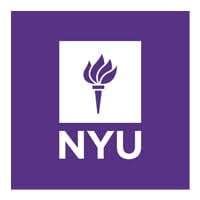
New York University
Remarkable Features:
- Private, Nonprofit university
- Low tuition fee
- Undertakes almost $1 billion in research annually
- Has a vast network of alumni worldwide
- Regionally accredited with Programmatic accreditation
New York University (NYU) is a dream destination for college students to gain a strong liberal arts foundation amassing more than 100,000 applicants each year. It is one of the country’s private, nonprofit universities that pride itself as an innovator in higher education.
NYU Online brings some of the world’s greatest minds to teach and brings NYU education everywhere through the three degree-granting campuses, including Abu Dhabi and Shanghai.
The School of Global Public Health, Graduate School of Arts and Science, and School of Professional Studies are among the schools within NYU that offer academic programs from the certificate to the doctorate levels.
The fields of study covered reflect NYU’s global focus while maintaining its New Yorker sensibility, and these include global health, public health nutrition, and journalism. The degree programs in project management, occupational therapy, education, and business administration are also popular.
Online students also have access to many on-campus resources intended to improve their student experiences while at NYU. The Center for Multicultural Education and Programs, LGBTQ Student Center, and Moses Center for Student Accessibility are a few of these resources.
Financial aid is also available to online students, and the Office of Financial Aid coordinates the various forms of scholarships, grants and loans.
NYU is fully accredited by the Middle States Commission on Higher Education (MSCH).
Check out New York University’s online degree programs!


Stanford University
Remarkable Features:
- Private, Nonprofit university
- Low tuition fee
- Private research institution
- Regionally accredited
Stanford University is an American institution that has provided “a place for learning, discovery, innovation, expression and discourse” for students since 1891. Stanford Online reaches learners globally, bringing them quality education from a private, nonprofit university online. Enroll in advanced degrees, undergraduate, graduate or even take free online courses and allow Stanford to help you meet your goals in your personal and professional life.
Working professionals enrolled in Stanford’s online degree programs benefit from the convenience, flexibility and accessibility of the courses. Students can earn their certificates or degrees completely online or via a hybrid model.
The 150+ current graduate programs are in accounting, advanced biomedical engineering, and advances in biotechnology, among other fields of study. The courses are delivered in several modes, too, from live online lectures, on demand and broadcasts from physical classrooms.
Stanford uses 10-week quarters with students spending between 15 and 25 hours per week on each course. Up to 18 credit units can be transferred to a graduate degree, meaning graduate students can reduce their tuition costs.
Most courses consist of 3-5 units and every unit has a $1,352 tuition, but reductions through scholarships, military discounts, and grants are possible. In fact, the majority of Stanford students don’t pay the full price of their education!
Online students can live stream their courses, view VOD after classes have ended, and download files to their personal computers. Other useful features include smart search and variable speed playback.
Most of the distance learning programs are delivered through Stanford’s dedicated platforms. But it also has third-party collaborations with Coursera, edX and Kadenze to deliver many of its online programs to a wider audience.
Stanford University is accredited by the Accrediting Commission for Senior Colleges and Universities of the Western Association of Schools and Colleges (WASC)
Learn more about Stanford Online’s degree offerings today!


Saint Joseph’s University
Remarkable Features:
- Private, Nonprofit university
- Low tuition fee
- Founded in the Jesuit tradition
- Regionally accredited
Saint Joseph’s University (SJU) is a private, nonprofit university founded in the Jesuit tradition sitting in Philadelphia’s heart. SJU still stands as strong as it did 160 years ago, integrating online and distance learning options to reach students wherever they are in the world. Saint Joseph’s online undergraduate, graduate, and certificate programs will guide you towards whatever career path you choose.
SJU offers degree programs in various levels, namely, bachelor’s and master’s degrees as well as post-baccalaureate certificates. There are also adult learner programs in healthcare administration and business, which are popular among working professionals and non-traditional students.
Online students attend virtual classrooms, communicate through email and discussion forums, and complete assignments via digital technologies. But online courses aren’t asynchronous by design, meaning students must complete their coursework according to schedule. While independent study is encouraged, the online courses aren’t self-paced.
SJU provides its online students with numerous tools toward their academic success and student experiences. The Nest is the online student portal that is a must for every student, as are Canvas (web-based learning management system), DegreeWorks (academic tracking program), and Starfish (for accessing student support services). Other facilities for online students are the advising support centers, career development center, and counseling and psychological services.
Online students are eligible for financial aid. Special discounts are offered for alumni, military veterans and their families, and employees of affiliated companies.
Saint Joseph’s is accredited by the Middle States Association of Colleges and Schools.
See Saint Joseph’s University online degree programs today!

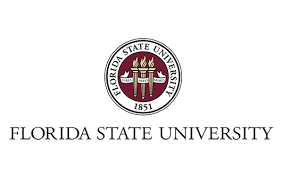
Florida State University
Remarkable Features:
- Public, Nonprofit university
- Public research university
- Low tuition fee
- Supported by the Florida State University Foundation, Inc.
- Regionally accredited
Florida State University (FSU) is a public, nonprofit university dedicated to maintaining excellence in teaching, research, creative undertakings, and community service. FSU brings its world-class undergraduate, graduate, and professional programs to the world through Distance@FSU. Distance@FSU is your online ticket to earning a degree from one of the nation’s top public universities.
The master’s degree programs in athletic coaching, systems engineering and civil engineering as well as the Doctor of Nursing Practice program are among the popular ones. These programs reflect the student-centered approach to education adopted by FSU, a top-ranking university in terms of National Science Foundation grants.
Online students receive the same rigorous academic and research training as their on-campus counterparts. With Nobel laureates, Fulbright scholars and Guggenheim fellows as professors, their education prepares them for the rigors of competitive industries.
Student support services, however, contribute to the best student experiences and academic excellence. These include academic advising and tutoring, online readiness and orientation programs, and technical support. Students also have the benefit of a virtual computer lab, software courses and tutorials, and encrypted cloud-based storage and backup.
FSU offers its programs in both synchronous and asynchronous delivery formats aside from the hybrid format. Online students pay low tuition – around $180 per credit hour for in-state undergraduate students and approximately $444 per credit hour for in-state graduate students. Tuition fee assistance is available for active-duty military and veterans in addition to scholarships and other forms of financial aid.
Florida State University is has earned accreditation from the Southern Association of Colleges and Schools Commission on Colleges (SACSCOC).
Learn more about Florida State University’s online degree program.
Frequently Asked Questions

Which is better… a for-profit or nonprofit college?
Generally speaking, most students prefer nonprofit colleges or universities because their tuition costs are usually lower.
Many of these institutions also offer on-campus and online degree programs and individual courses.
Both public and private colleges and universities can be non-profit educational institutions. Instead of reaping profits and distributing them among shareholders, nonprofit institutions spend their funds on curriculum and instruction development, recruitment activities, and projects intended to improve their services.
What are the differences between nonprofit and for-profit institutions that must be considered in your choice?
There are significant differences between these two types of institutions that will affect your choice in a university.
- Purpose
Nonprofit institutions offer broad liberal arts-centric education that allow students to explore the diverse opportunities in their fields of study. Exceptional student and faculty support services are emphasized, meaning the university community provides a supportive environment for their success.
For-profit institutions are more career-oriented with an emphasis on earning revenue and profits. Student learning outcomes may be compromised but there are a few excellent for-profit universities, too, like the University of Phoenix.
- Funding sources
For-profit colleges get most of their funding from student tuition and fees as well as from investors, subsidiary businesses, and private donations including corporate sponsorships. Funding from public sources, such as from the government, is uncommon. For this reason, these institutions have more aggressive student recruitment programs, usually through advertisements.
Public nonprofit institutions receive most of their funding from the state and federal governments with student tuition and fees filling in the gaps, so to speak. Private nonprofit institutions secure their funding from private donations, endowments and grants as well as from student tuition and fees.
Since nonprofit institutions receive donations and other forms of subsidies from public and private entities, their tuition and fees tend to be more affordable than in for-profit institutions. The disparity is particularly significant in comparisons between for-profit and public school in-state tuition.
Both for-profit and nonprofit institutions, however, offer financial aid in various forms including scholarships, grants and work-study schemes.
- Admission criteria and process
While there are exceptions to the rule, for-profit colleges tend to have less rigorous criteria and process for its admissions. Many have flexible admission options that result in high admission rates, which can be beneficial for many students.
Nonprofit institutions, particularly the Ivy League and Public Ivies, have selective admission processes. The result: Low admission rates with the accepted students considered as the cream of the crop.
- Academic programs and courses
Both nonprofit and for-profit institutions offer degree programs in several levels, from associate to doctorate degrees as well as certificate programs. But the quality of instruction, among other measurements of quality, can differ, sometimes in a significant manner!
Public and private nonprofit institutions typically have regional accreditation while for-profit institutions have national accreditation; many of the latter, however, have regional accreditation. Accreditation is of crucial importance when choosing a college or university as it influences the acceptability of the degree among employers, as well as options in transfer of credit and financial aid opportunities.
- Recognizability and acceptability among employers
Nonprofit institutions are generally regarded with respect and recognition across industries and employers, even among colleges and universities. Exceptions exist but, more often than not, nonprofit institutions won’t accept credits from nationally accredited for-profit colleges; regional accreditation is usually the criterion for exception.
But there are also industries where employers prefer applicants with training from for-profit colleges. This is particularly true for career-oriented occupations like massage therapists, mechanics and electricians.
Are for-profit colleges bad?
Not necessarily! Nonprofit and for-profit institutions meet different needs among learners. What may be an excellent fit for you may not be so for another individual.
For-profit colleges have their merits, too, including:
- Less selective admissions policy result in faster and easier enrollment, particularly for applicants with average grades and standardized test scores;
- More flexible and convenient learning options are available in addition to the fairly diverse fields of study across all degree levels;
- More career-oriented education and training can translate to more preparedness for the workplace;
- More diverse student body due partly to the less strict admission policy
But beware of issues related to for-profit schools, too! Many of these issues are related to accreditation, such as colleges less receptive to transferring credits and employers being doubtful about the diploma’s value. Graduates in for-profit schools are also at greater risk for higher student loan debts and default rates, not to mention the risk of not earning a degree due to the expensive cost of attendance.
Ultimately, the choice to enroll or not to enroll in a for-profit college is yours to make! You must decide based on your unique needs and circumstances, such as your desire for a career-oriented degree.
What are the benefits of nonprofit online colleges for students?
- Nonprofit online universities carry the credibility of a traditional brick-and-mortar university. The higher quality of instruction contributes to the academic rigor desired by students and employers alike.
- Tuition payment is required in nonprofit online universities, and this fee would go to the school’s administration and maintenance. Nonprofit online universities generally charge less tuition due to state funding and other financial aid options. Students are then less likely to graduate with overwhelming student loans debt and default on their payments. With less debts to worry about, there’s more focus on career development and advancement.
- Nonprofit online universities are mostly regionally accredited, giving more credit and weight to your degree. Regional accreditation is considered the gold standard, so you do not have to worry about losing your credits when you choose to transfer.
- Nonprofit online universities adopt a student-centered education committed to improving students’ experience to increase student success rather than profit.
- Nonprofit online universities operate independently, free of control from shareholders.
But there are also disadvantages to nonprofit colleges. With a more selective admission process, the student body can be smaller, perhaps less diverse. But it must also be said that it’s among the reasons for their enduring popularity as institutions of academic excellence!
What should be considered when choosing an online non-profit school for your educational needs?
First, look at the academic standards and overall reputation of the nonprofit schools. You want the best possible recognizability and acceptability for your degree in your field of study. Consider the graduate outcomes including the percentage of students who pass licensure/certification exams and are employed within 6-12 months after graduation.
Then, consider the cost of attendance. Do you have the financial resources to afford it until time-to-completion? Does the school have satisfactory financial aid services and programs? Do you have external tuition reduction resources, such as from your employer, fraternity, or community group?
Additional helpful resources:

